- Home
- Sonya Hartnett
The Children of the King
The Children of the King Read online
She heard it: footsteps in the dark.
Cecily Lockwood, aged recently twelve, quailed in the darkness beneath her bed and listened to the steps coming closer. The curtains of her bedroom were drawn and only a ribbon of light nosed past the door, and sense told Cecily that she must be nearly invisible in the blackness: but she did not feel invisible. Her teeth bit her lip. Her heart bounced like a trout.
The footsteps had climbed the stairs. Cecily had heard the creak of each tread. The steps had come stealthily along the hall, pausing in each doorway. There’d been a silence when the steps reached her brother’s room; Cecily had pictured Jeremy folded under his bed, his heart flipping and diving. But no: Jeremy was too smart to hide under a bed. Jeremy would hide somewhere that could keep him secret all night. Only Cecily was silly enough to hide under a bed.
Now the footsteps had resumed. The rugs muffled them, but still they could be heard. Closer, closer — then a sudden bump, an oof. The steps had walked into the hall table. Cecily couldn’t help but smile.
But the hall table stood just outside her bedroom, and it was abruptly too late to change her hiding-place for a better one. The door eased back on its hinges, letting in a shaft of soft light. Cecily held her breath, peeked past the bedspread’s hem. The maker of the footsteps was carrying a candle, a long white taper taken from the dining table. Its flame cast a quavering circle of orange light. It radiated its glow onto the face of a man wearing a mask — a gas mask. The silvery goggles reflected the flame as a pair of burning pupils. The canister below them heaved like a horrible snout. At the sight of this monster, Cecily almost screamed. Almost.
The man stopped in the centre of the room. The candlelight grazed the rocking-horse, the hatstand, the shelf of china beasts. The masked head turned slowly to the window. The man was not puffing, but the mask made his breath sound like paper on fire. It took a single stride for him to reach the window. Holding the candle to one side, he felt amid the curtains. From beneath the bed Cecily watched, her heart denting the floor. When he didn’t find her in the drapery, the man turned and pondered the darkness again.
She didn’t need to hear him say, I know you’re in here.
Three strides took him to the wardrobe. He threw back its door with a conjurer’s flourish. Cecily nearly shrieked. She wasn’t in the wardrobe, but she felt as if she was.
And now the man knew she wasn’t in the wardrobe.
He turned painstakingly, on his toes. The hand that held the candle was spotted with white wax. A haze of candlelight fluttered over a wall. The flames that were the man’s eyes fixed themselves on the bed. He had no voice, but Cecily heard him say, Come out from under there.
She could not bite back the tension any longer: she squeaked. Instantly the intruder dropped to the floor, flinging aside the quilt. The treacherous candle sent its rays onto the girl’s aghast face. The man reached out a long arm, a hand dotted with wax. The hand closed on Cecily’s wrist like a noose.
It was time to start yelling, and Cecily yelled. “Murder!” she bawled. “Kidnap! Help!” She struggled, grabbing at the bedsprings, but the hand dragged her from beneath the bed as easily as a pup from a drain. Tangled in dressing-gown, twisting eelishly, she plunged into the man’s arms. “Kidnap, police, help!” she bellowed. She thumped his chest, the candle tipped, the man said, “Oof !” again. Cecily was only twelve, but she wasn’t a twig. “Police!” she howled. “Monster! Murder in the dark!”
The man pulled off his mask. In the charcoal darkness Cecily saw his glittering eyes. “Found you!” he cried. “Now you’re doomed, little girl! Any last requests?” And he wrapped his arms around her, and cuddled her like a lion.
“You’re supposed to kidnap me, Daddy, play properly!” Nonetheless she ceased writhing and hugged him extravagantly. “Did you find Jem?”
“No.” Her father clambered to his feet, hoisted his daughter to hers. “Jeremy wins again.”
Jeremy always won — it was tedious. On the other hand, Cecily was always glad to be found. This game of hide-and-seek in the dark was thrilling, but also a touch hair-raising. “Jem!” she yelled. “You can come out now! He’s found me!”
In the flurry of her unearthing, a gap had opened between the curtains, and her father went to close them. He lingered a moment at the glass, staring down into the street. Cecily came close and looked too. Their house stood in a sweeping terrace of identically grand houses, each with pillars beside the front door and curved steps leading down to the footpath. Every house had a fence of iron spikes and rows of wide sash windows. All the gates were shut, all the doors firmly closed, all the windows taped and blackened. No lamp illuminated the footpath, no cars travelled the road. Every street in London was subdued, lit only by candles and the kindness of the moon. Cecily knew the banning of bright light was a good thing, intended to keep the city safe . . . but it frightened her. What the blackout meant frightened her. Her entire world was hiding in darkness, but not because it was playing a child’s game.
Her father closed the curtains fastidiously. He looked down at his daughter, tucked a disarrayed curl behind her ear. “Come downstairs, Cecil-doll,” he said. “There’s something I want to tell you.”
His child raised her face to him — a blue-eyed, slightly chubby and rather plain face, praised by her father as beautiful from the moment she was born. On this face was a frown. “Something good, Daddy?”
“Do I ever tell you anything that isn’t good, doll?”
“No,” she admitted.
Jeremy was standing at the top of the stairs, slender and moody in his pyjamas and dressing-gown. “Where were you hiding?” Cecily asked, but her brother would never give away such holy secrets and his only answer was to raise a haughty chin. This made no sense to Cecily, who said, “What’s the point of hide-and-seek if you can’t be seeked?”
Jeremy said, “Don’t be stupid, Cecily. You’re not supposed to be found. And you needn’t scream like a lunatic when you are. You embarrass yourself. And seeked isn’t a word.”
Cecily chewed her cheek. “Daddy’s going to tell us something,” she bragged, but doing so did not completely quash the urge to push her brother down the stairs. One day, she was sure, Jeremy would be pleased he had a sister. That day had not arrived.
Their mother was sitting in the drawing room. It wasn’t a cold night but there was a good fire weaving its tale behind the guard. A fire was necessary, as its flames lit the room and made it cosy. It had come as a shock to many, and certainly to Mrs Heloise Lockwood, to discover that the blackout made velvet and silver and brocade and silk as comfortless as tin and tar.
“Daddy kidnapped me.” Cecily flopped at her mother’s feet.
“So I heard. I’m sure the man in the moon heard too.”
“She doesn’t play properly.” Jeremy folded into a chair, radiating sourness. “She never plays properly. She hides in the most obvious places. She always gets found in five minutes.”
Cecily rolled onto her back and blinked placidly at the ceiling. She had long ago learned that if she let her brother’s grievances bother her, she would be bothered every moment of her life. “Cecily, you are crushing my feet,” said her mother, so she moved lumpily aside. Their father was pouring brandy, and when he handed a glass to his wife the liquid caught the light and Cecily saw it swirl redly, as if stirred by the devil’s finger. She asked, “What were you going to tell us, Daddy?”
Her father looked at her from his very tall height. He did not sit, which made Cecily realise that whatever he had to tell them was serious. She sat up.
“Children,” he said, “you know why London is blacked out, don’t you?”
It was a question insulting in its simplicity, and Jeremy nar
rowed his eyes. “In case of an air raid,” Cecily obliged. “If planes come at night, they’ll look for city lights. It will be hard for them to see the city, if all the lights are turned off. But there hasn’t been an air raid,” she said — then, uncertain what an air raid precisely was, added, “Has there, Daddy?”
“Not yet, dolly. But we’re sure there will be. The war has come very close to us now.”
Cecily knew this, although she understood it, too, only vaguely. For weeks she’d heard talk of France falling, and while that sounded unlikely — how could a country, stuck firmly to the globe, fall or drop off ? — she sensed that, whatever it was and however it could happen, it was grim. “I’m sad for poor France,” she sighed. She’d been there several times and come home with nice souvenirs, so she felt its tragedy personally.
“The war is going to be bad for France,” her father agreed. “It will be bad for us too. Already it’s very bad, and it will certainly get worse.”
“Humphrey,” said Heloise.
“There’s no point pretending otherwise, darling. This war has already been a rotten fight, and there’s no acceptable end in sight. Thousands have died, and thousands more must, if we’re to triumph. And at the moment, victory is no certainty. Indeed, at present it’s looking increasingly unlikely. France has fallen, and logically we must fall next.”
Even Jeremy, who relished such talk, stared in silence. The man who stood in the jagging light of the fire seemed less their cherished father than some craggy messenger sent up from Hades. “We won’t, though.” Jeremy spoke flatly. “We won’t fall.”
“We’ll try our best not to. But we are fighting a strong and determined enemy.”
“We are strong. We are determined.”
“A mouse can be strong and determined. But not as determined as a cat.”
Jeremy said, “We’re not mice.”
Cecily glanced at her mother, whose face was as stony as a marble Madonna’s. Air raids and soldiers, fighting and dying, cats, mice: she wished she had someone’s hand to hold. “Daddy,” she said, “will we die?”
Her father turned his gaze to her, eyes that were the same shade of blue as hers but, in him, sharpened by years of deliberation and decision. For an instant these eyes seemed to see his daughter not as his child, but as his task. Then he said, “No, Cecil-doll, you are not going to die. You’re going on a holiday.”
Cecily’s eyes widened, she saw the happy seaside, but her brother said crisply, “You’re evacuating us?”
“It’s best, son.”
“No it isn’t. Why is it?”
“You know very well . . .”
The boy sat up straighter. “Other people are staying.”
“It’s decided, Jeremy.”
“What about school? I can’t leave school —”
“Jeremy,” said their mother, “please don’t fuss. I don’t want you here, where it’s dangerous.”
Their father spoke. “I’ve already kept you with me for longer than I should have. My colleagues sent their families away weeks ago. But I’ve been reluctant: I don’t want to be without you. I’ve been hoping events would unfold in such a way that you could stay. Unfortunately, the situation has worsened. The threat we’re under is very real, children. I can’t allow my selfishness to put you in danger. I couldn’t live with myself if I became the cause of your suffering.”
Jeremy and Cecily knew that the beloved voice, warm and mellow as pelt, masked a will of iron: the discussion was over and Jeremy knew it, yet he would not surrender. “What about you, Mother? If it’s dangerous for us here, it’s dangerous for you.”
“I will be coming with you.”
“And what about Fa?”
“Your father is staying in London.”
Jeremy’s blond head swung to his father. “Let me stay too. I’m not afraid.”
“It isn’t a matter of being afraid,” his father replied. “I know you’re brave. But it isn’t safe, and I want you to be safe.”
The boy stared. “I’m not a child.”
“Please don’t fuss,” sighed Heloise.
“You’re my child,” said Humphrey Lockwood. “A most important child.”
Jeremy kicked the chair. “But I want to stay! I want to help! I can help, Fa, I’m smart, I’m strong —”
“We’re leaving tomorrow on the nine o’clock train —”
“Tomorrow!”
“— so go upstairs and decide what you want to bring. We might be away for some time —”
“How long? For the entire war?”
“Please stop shouting, Jeremy. Sometimes I believe you’re worse than your sister.”
Jeremy snapped his mouth shut. His eyes, which were a handsome deep-brown like his mother’s, skimmed the shadowy spaces of the room. When he spoke, Cecily heard bitterness swilling through him. “It’s not fair, Fa. You’re our father, a most important father. Shouldn’t you be safe too?”
“It’s my duty to stay.”
“But not mine?”
“You’re fourteen years old, Jeremy. Your duty is to live to grow older.”
Jeremy looked away. In the fireplace a burning log broke, showering the hearth with sparks. Cecily asked quietly, “Where are we going, Daddy?”
Her father turned from the son who was like those brilliant sparks of the fire, to the daughter who was as unremarkable as a daisy. Gratefully he told her, “You’re going to Heron Hall.”
Cecily sat with her forehead on the window, her eyes scrolled down so she could see the embankment rushing past as an endless grey smear. She tried to force her gaze deeper, to see the train’s wheels and polished side and maybe the words painted there: First Class. But her eyeballs would swivel only so far and no further, depriving her of class and undercarriage; she sat back in the seat. She had some paper dolls and pencils for colouring them, as well as a book of puzzles, but nothing held her interest. Nothing could cage the bird-like flitter of her mind.
She remembered saying goodbye to her father, her arms around his neck. Though it had taken place only that morning, the parting was already a careworn memory. Cecily recalled cryng, tears slithering down her cheeks . . . yet something had been strange. Inside herself, she hadn’t wanted to cry. To leave her father alone in the imperilled city was such a desolate thing that tears felt oddly mocking. She’d longed to tell him the vital secret which would protect him through the lightless nights, but she didn’t know the secret, so she had cried instead. Her father had had to jolly her, as if she were a baby. Cecily enjoyed being babied . . . but those tears had been shaming. Daddy had been left behind, and nobody knew when they’d see him again nor what trials he would endure before then: and through it all he would remember Cecily as a blubbering simpleton, never knowing that, inside, she’d wanted to be so much better.
“Stop,” said Jeremy.
Cecily looked up. Her brother sat opposite, his hair a blond halo against the green seat. He was staring at the scenery and for an instant Cecily wondered if he was talking to the fields or the sun: stop shining! But he was talking to her. “Don’t chew your nails. It’s sickening.”
Cecily shoved her hand under her thigh. She glanced at her mother, expecting flanking rebuke; but Heloise sat with her eyes closed, her face the marble Madonna’s. Dead, thought Cecily. And hastened to add, Please don’t be dead. She wished Jeremy had a habit she could likewise brand with that fierce word sickening, but her brother was not the type to forage in his nose or release ungentlemanly sounds, to do anything that risked lowering his towering dignity. Maybe that was her brother’s failing, Cecily mused. He hardly ever remembered what their father, last night, had had to remind him: that he was just a boy.
She looked out the window. Green fields fringed with hedgerow, clouds casting odd-shaped shadows. Her thumbnail, incompletely chewed, was singing a siren’s song. Knowing Jeremy was watchful, she thought of other things.
They’d taken a taxi to the station, a luggage van following like an elephant behind a bla
ck beetle. The station, when they’d arrived, had been startling. The cavernous building was always busy, but this morning it had been so crowded that Heloise had made the viper noise she usually reserved for Christmas. The crowd was of a kind such as Cecily had never seen. It was a crowd of children, all heights and ages, some dressed in good clothes, scrubbed boots and brushed hats, others in greasy rags. Some were chatting like parrots, casting grins here and there; others were sobbing into handkerchiefs knotted in their palms. Some held the hands of siblings, most carried gas masks, many of the younger ones clutched goggling toys. The children bumped against one another, touched their fingers to the sleek side of the train. Each gripped the handle of a satchel or small suitcase. On many of these cases the owner’s name was written, and Cecily imagined a mother carefully printing out the words. Her own suitcase was too fine to write on; it had a leather tag.
Which brought her to what Cecily decided was the oddest aspect of this herd of children. Pinned to the lapel of every child’s coat had been a cardboard tag exactly like a luggage tag or a price tag. Cecily was not so daft as to assume the children were for sale. She knew what they were. They were evacuees, some of the many thousands of the city’s children being spirited beyond reach of the war into the countryside, just as she and Jeremy were being spirited. Unlike the Lockwood siblings, however, these children were not travelling in the company of their mothers to a place they knew and were fond of. There were several ladies among the crowd but they had the look of teachers, orderly, strict, aware — not the kind of ladies, Cecily sensed, who could be relied upon for a comforting word. These luggage-tagged children had been placed by their parents into the care of strict strangers to be hustled away into the unknown; and although it was for the children’s own good, many of them looked as if their tiny hearts had broken.
Cecily bent her head. Heron Hall was far away, well past the lime-green fields and white villages that looked like something you could fit into your pocket. Their journey would not end for several hours. She thought about the children packed into the carriages behind her, the great weight of their bodies burdening the train. She wondered if they were sitting quietly or running about like wild dogs. How good it would feel, to run like a wild dog. Those no-nonsense ladies would doubtlessly demand best-behaviour, and only the baddest child would disobey. She wondered if the crying ones still wept.

 Butterfly
Butterfly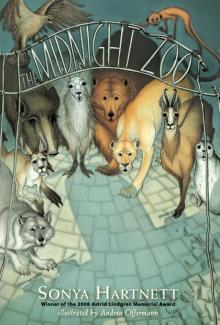 The Midnight Zoo
The Midnight Zoo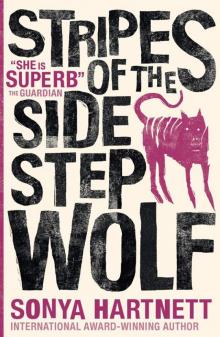 Stripes of the Sidestep Wolf
Stripes of the Sidestep Wolf The Best Australian Stories 2012
The Best Australian Stories 2012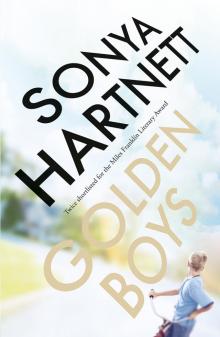 Golden Boys
Golden Boys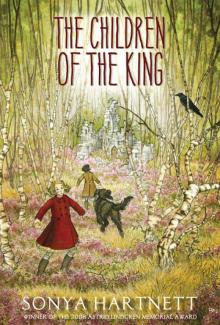 The Children of the King
The Children of the King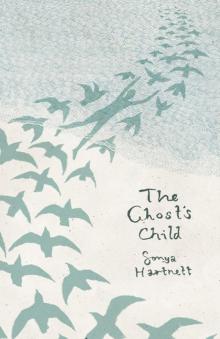 The Ghost's Child
The Ghost's Child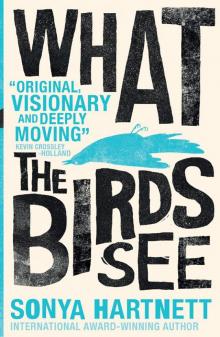 What the Birds See
What the Birds See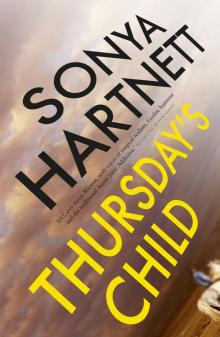 Thursday's Child
Thursday's Child